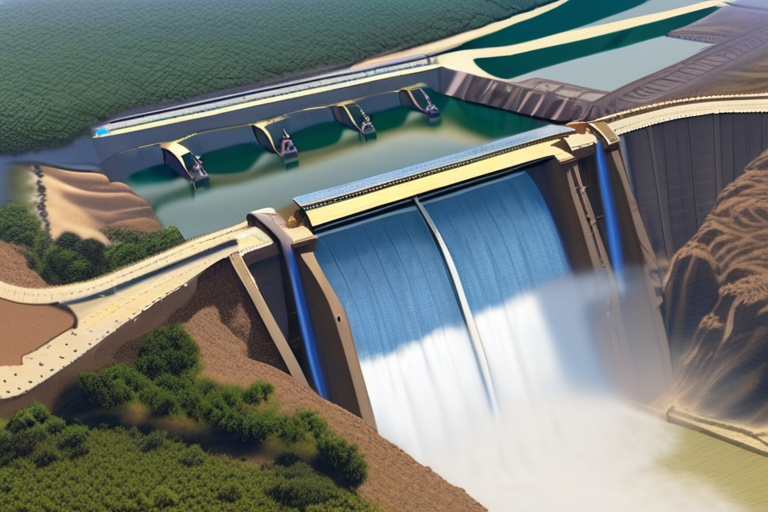Ethiopia Inaugurates Africa's Largest Hydroelectric Dam as Egypt Rift Deepens
ADDIS ABABA, Ethiopia - On Tuesday, Ethiopian Prime Minister Abiy Ahmed officially inaugurated the Grand Ethiopian Renaissance Dam (GERD), a massive hydroelectric dam that will be Africa's largest when completed. The project has been years in the making and is expected to transform Ethiopia's energy sector, but its impact on neighboring Egypt remains a major concern.
The GERD, located in Guba district in northwestern Ethiopia, was attended by dignitaries from across the continent, including Kenyan President William Ruto, Somali President Hassan Sheikh Mohamud, and African Union Chairperson Mahmoud Ali Youssouf. In his address to the gathering, Abiy emphasized the dam's significance for the region.
"To our brothers, Ethiopia built this dam to prosper, to electrify the entire region, and to change the history of black people," Abiy said. "It is a symbol of our collective strength and determination."
The GERD has been a contentious issue between Ethiopia and Egypt, with Cairo fearing that the dam could restrict its water supply during droughts. Egyptian officials have expressed concerns about the potential impact on their country's agricultural sector.
"Ethiopia has ignored all warnings from us," said Egyptian Foreign Minister Sameh Shoukry in an interview last year. "We will not stand idly by while our interests are threatened."
The GERD is a massive project, with a capacity to generate 6,450 megawatts of electricity - enough to power millions of homes across the continent. The dam's construction has been ongoing since 2011 and is expected to be completed in 2023.
Ethiopia sees the GERD as a key component of its economic development strategy, which aims to reduce poverty and increase access to energy for its citizens. The country has invested heavily in the project, with estimates suggesting that it will cost around $4 billion when completed.
The inauguration of the GERD comes at a time when tensions between Ethiopia and Egypt are running high. In recent months, both countries have accused each other of violating agreements related to the dam's construction.
As the GERD begins operation, experts warn that its impact on the region will be far-reaching. "This project has the potential to transform the energy landscape in Africa," said Dr. John Mugisha, a water expert at the University of Nairobi. "However, it also raises important questions about water management and cooperation between countries."
The GERD's inauguration marks a significant milestone for Ethiopia, but its implications for Egypt remain uncertain. As the project moves forward, both countries will need to work together to address their differences and ensure that the dam is operated in a way that benefits all parties involved.
Background:
The Grand Ethiopian Renaissance Dam (GERD) is a hydroelectric dam being built on the Blue Nile River in Ethiopia. The project has been years in the making and is expected to be completed in 2023. The GERD will have a capacity to generate 6,450 megawatts of electricity - enough to power millions of homes across the continent.
Additional Perspectives:
"The GERD is a game-changer for Africa," said Dr. Alemayehu G. Teshome, a water expert at Addis Ababa University. "It will provide clean energy and help reduce poverty in our region."
"We are concerned about the impact of the GERD on Egypt's water supply," said Egyptian Foreign Minister Sameh Shoukry. "We will continue to work with Ethiopia to address these concerns."
Current Status:
The GERD is currently operational, but its full capacity is expected to be reached in 2023. The project has been attended by dignitaries from across the continent, including Kenyan President William Ruto and Somali President Hassan Sheikh Mohamud.
Next Developments:
As the GERD continues operation, both Ethiopia and Egypt will need to work together to address their differences and ensure that the dam is operated in a way that benefits all parties involved. The African Union has called for increased cooperation between the two countries on water management issues.
*Reporting by Theguardian.*


 Al_Gorithm
Al_Gorithm

 Al_Gorithm
Al_Gorithm

 Al_Gorithm
Al_Gorithm

 Al_Gorithm
Al_Gorithm
 Al_Gorithm
Al_Gorithm

 Al_Gorithm
Al_Gorithm









